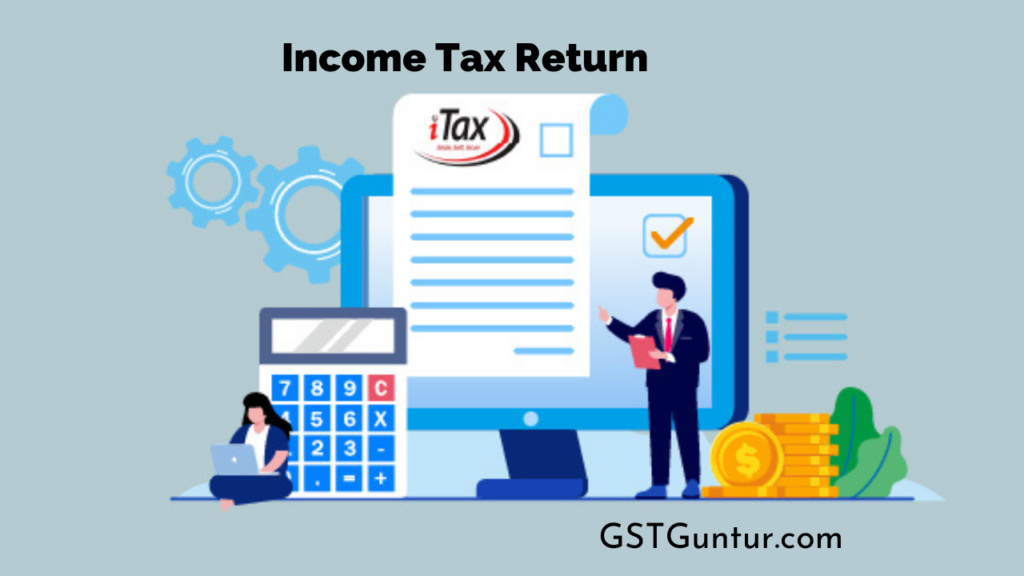Income Tax Return: ITR or Income-tax Return is a form in which a person files information about his/her salary and the tax they have to pay during the year. Taxable income can be of various forms, such as capital gains income, income from house property and salary, income from interest on deposits, dividend, royalty income, or winning the lottery. It can also be from profits and gain from any business or service. The information entered in the form of ITR should be under the given year, between 1 April of the year and 31 March of the subsequent year.
Due to the ongoing pandemic, the department of IncomeTax has extended the ITR filing deadline for 2020-21 to reduce the pressure on individual TP and decrease the compliance burden for businesses coping with the current situation. As per the income tax law, individual taxpayers filing ITR-1 or 4 must file their return for the preceding FY (2020-21), which ends March 2021, by 31 July ’21. The deadline for corporations and firms whose accounts are to be audited is on 31 October.
The ITR Forms
Every year, the income tax department takes measures to simplify the filing return process and prompt more people to partake in this yearly activity. Some of the steps it has used include simplified tax return applications, enabling paperless return filings, rendering pre-filled tax return forms, etc. There are a total of 7 forms prescribed by the Income Tax Department that includes ITR 1, ITR 2, ITR 3, ITR 4, ITR 5, ITR 6 and ITR 7, and the forms applicability depends upon the type of taxpayer and the amount and nature of income.
- ITR Form- 1: ITR 1 form is commonly known as Sahaj. This form is one of the most used forms for ITR filing and can be listed by resident Individuals who have income up to Rs. 50 Lakhs in the Financial Year (FY).
- ITR Form-2: This Form is for individuals and HUF earning income other than income from “Gains and Profit from Business or Profession”. Thus, people with income from Salary or Pension, capital gains, foreign assets, or income from agriculture earning more than Rs5000 are eligible to file the ITR 2 Form.
- ITR Form-3: The ITR 3 form is somewhat similar to ITR 2 form applicable for individuals and HUF who have income from profits and gains from business or profession. People carrying on a business or profession or income from House property, Pension or Salary, capital gains are eligible to file ITR 3.
- ITR Form-4: ITR-4 Form is for the taxpayers who choose a credible income scheme under Section 44AD, 44ADA and 44AE of the ITA and those whose income is less than Rs 50 lakhs.
- ITR Form-5: The Form-5 of Income Tax Return requires to be filed by entities such as Artificial Judicial Person, Limited Liability Partnerships, Association of Persons (AOPs), and BOI. Apart from that, any cooperating local or social authority can file their income tax return using this form.
- ITR Form-6: Individuals who gain income from property held for religious or charitable purposes under section 11 can file their income tax return in the ITR-6 form.
- ITR-7 Form: The ITR form 7 can be filed when individuals, including companies, come under section 139 (4A)(4B)(4C)(4D). This form does not need any documents while filing Tax Returns. However, taxpayers are instructed to match the taxes received, deducted or paid by or on their account with the Tax Credit Statement Form 26AS.
Advantages of Filing ITR on Time
Under the IT Act, every individual must file their income tax return within the designated time, i.e. due date. If they fail to file an income tax return before the due date, then they shall be accountable. Therefore it’s beneficial to file and pay the ITR on time as it also helps in certain ways.
- Filing Tax Returns keeps you tax-compliant and helps to avoid unnecessary penalties. Penalty under section 234F is levied from the FY 2017-18 of an amount up to Rs. 10,000 if one fails to file tax returns by the mandated date. This is a compulsory penalty and can not be ignored by the income tax officer.
- It also helps to avoid paying interest. Interest under section 234A is if a person has some exceptional taxes owed to the IT Department, then the interest is chargeable at 1% per month on the outstanding tax from the expected date till the present return filing dates.
- It also helps to get easy loan approval; as such, when an individual has to apply for their house or vehicle loan, they need to produce their Tax Return copy to apply for the loan. Therefore it benefits from getting Easy Approval for Loan.
- A Taxpayer can revise his return in case of a mistake, but this right is not feasible if the return is filed after the due date.
- The ITR can also be used as proof of your Address and income.
- While applying for VISA, most embassies and consulates ask for copies of ITR. Therefore filing ITR in time also benefits in receiving their Visa on time.
FAQ’s on Income Tax Return
Question 1.
What are the general documents needed to file ITR?
Answer:
The documents needed for filing Income Tax Returns are aadhaar card number, Pan Card number, TDS Certificate Form 16 or Form 26AS, Details of Bank Account. Tax Payment Challan, Bank Account – Account number, IFSC details, bank name, and Original Return or Notice.
Question 2.
What is the ITR policy for senior citizens?
Answer:
The 2021 Budget has proposed to excuse senior citizens from filing income tax returns if interest income and income by pension are their only yearly income source. In addition, section 194P has been inserted to enforce the banks to deduct tax on senior citizens more than 75 years of age who have a pension and interest income from the bank.
